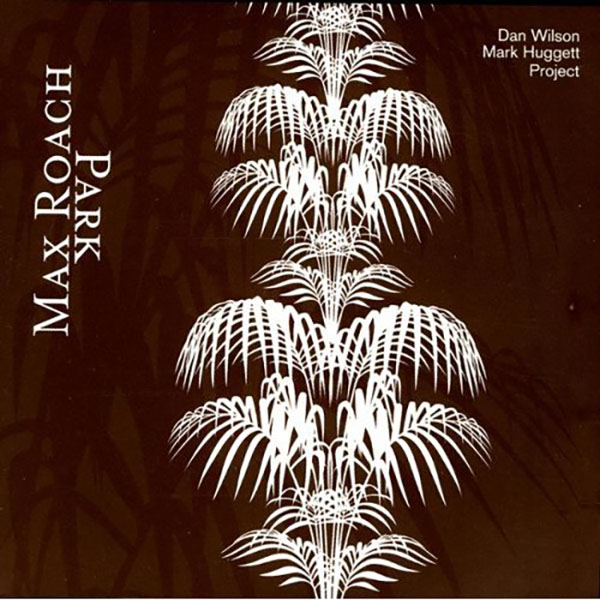
by Ian Mann
November 28, 2006
/ ALBUM
At its best the duo's approach recalls that of Jah Wobble - mighty grooves, multi cultural elements but still an unmistakable London flavour, albeit with a greater jazz influence.
When I first set eyes on the album cover I knew I wanted to like a record with a title like that! Fortunately Wilson and Huggett don’t disappoint and their global grooves make for fascinating listening.
Rhythm team Wilson (bass, keyboards) and Huggett (drums) were inspired by reggae legends Sly Dunbar and Robbie Shakespeare- pretty good role models for any rhythm section I’m sure you’ll agree. Innovative UK trombonist Annie Whitehead and her colleagues Jennifer Maidman and Steve Lodder have also been major influences.
For “Max Roach Park” Wilson and Huggett have called on musical friends from all over the world. There are South African and Native American musicians on the record together with players from England, Ireland and Norway. Huggett is London based and these influences reflect the cosmopolitan vibe of the city.
“Vuleka” opens the album, it’s walloping grooves augmented by the South African voices of the Vuleka organisation. Bassist Wilson is a native of South Africa and this in part reflects his roots.
The groove continues on “Mr M.D.” which I assume is a tribute to Miles Davis as it features the Milesian trumpet of the Norwegian musician Yngvil Vatn Guttu. Guitarist Dave Warren also shows up strongly. As on the previous track the muscular tenor saxophone of James Tartaglia also features prominently.
The Jazzmann is based in Hereford as some of you are probably aware by now, so we have a special reason to salute James as he also hails from that fine city. He joins a list of Herefordian jazzers that includes the great Mike Osborne (alto sax), bassists Thad Kelly and Ben Hazelton and trumpeter Bryan Corbett.
We also gave the world The Pretenders (alright the American chick was the star but she had a hell of a band behind her) and Mott The Hoople (we’ll claim Hunter as our own). Not bad for a so called provincial backwater.
Tartaglia comes from a family of ice cream salesmen. Does this make him jazz’s answer to Francis Rossi? Mind you I’m sure the Berkeley trained Tartaglia knows a lot more chords!
However, I digress.
The voices of the Native American Zuni people appear on the next track, appropriately entitled “Zuni” in their honour. This is a haunting piece of work, the voices set against Huggett’s chattering percussion and Wilson’s low register bass growl.
“Fireweed” is back to the big grooves with Tartaglia again to the fore.
Huggett has stated that he wished to use vocals on the album but not in the cliched “standards” style. Following on from the distinctive singing we have already heard Guttu now adds a semi spoken Norwegian vocal to “Mello”.
It would seem that Wilson and Huggett have chosen to fire their best shots early. Despite it’s fine title “William Blake” tends to meander as does the following “The Forty Niner” and both tracks, though not unpleasant seem somewhat unfocussed compared to what has gone before.
“Bells” is more consciously laid back and the flute of Irish musician Teresa Walsh adds much to the atmosphere.
Guttu’s trumpet takes centre stage for “Chesil” and “No Mans Land”, both semi ambient meditations with a Miles Davis flavour.
The brief drum and bass duet “Kenyon” carries us forward to “Tau Ceti” which once again features the big acid jazz style grooves which characterised the early tracks of the album. Wilson and Huggett at are at their most effective in this mode but perhaps a whole album in this vein would be too much. Their attempts to vary the pace, although not wholly successful are therefore to be admired.
“A Greener Room” is a feature for Huggett’s drumming. The closing “Pray” sees Guttu’s trumpet sound drawing closer to that of his compatriot Arve Hendriksenor perhaps Nils Petter Molvaer . It is offset by Wilson’s multi-tracked electric bass.
Overall “Max Roach Park” is a success. Its best moments are very good indeed and mostly appear on the album’s early tracks. The use of vocals is imaginative and should perhaps have been more widespread as the album flags later on and loses some of its energy and focus. The heavy grooves give way to a more ambient approach which is not as successful or distinctive.
At i’s best the duo’s approach recalls that of Jah Wobble - mighty grooves, multi cultural elements but still an unmistakable London flavour, albeit with a greater jazz influence. Jah Wobble meets jazz, if you like.
And finally… yes there is a real Max Roach Park. It is in the London Borough of Lambeth and was named after the great American jazz drummer when he visited the city in the 80s for the London Against Racism concert. Partisans also dedicated their 2005 album “Max” to him. This excellent record deserves your attention also, it’s a superb blend of rock energy and jazz chops and features Thad Kelly (mentioned above) on bass.
blog comments powered by Disqus